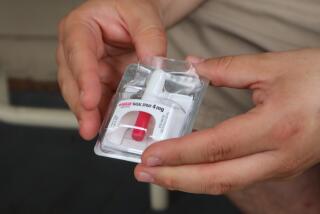AIDS Plan Would Broaden Physicians’ Access to Tests
Attempts are under way to amend California’s AIDS blood test law to make it easier for medical personnel to order the tests and to grant them greater access to the results.
Some physicians, nurses and other health-care workers have complained that the current law’s strict confidentiality requirements may prevent them from finding out the test results. The absence of such information, they say, may be hindering effective medical care.
The current law, rushed through the Legislature with widespread support last spring, permits blood banks to screen potential blood donors. It was narrowly written to protect the privacy of blood donors and prohibits employers and insurance companies from obtaining test results.
But increasingly the AIDS blood test is being used for other purposes that are not covered by the 1985 law, including the diagnosis of AIDS-related illnesses and the counseling of individuals at high risk of AIDS. And as the usefulness of the test has grown, there are continued fears that people who test positive may be discriminated against.
‘Loosen the Law Up a Bit’
Now a “cleanup” bill has been introduced by Assemblyman Art Agnos (D-San Francisco) that would “loosen the law up a bit” by making the test results more available to doctors.
It also would permit involuntary blood testing in rare situations, such as before placing a child who may carry the virus in a foster home or after a person is convicted of a crime, such as rape, in which AIDS could have been transmitted to the victim. The Assembly Health Committee is scheduled to hold a hearing on the bill Tuesday in Sacramento.
Agnos said his bill would be an alternative to last month’s proposal by Kenneth W. Kizer, director of the state Department of Health Services, who suggested that, “when compelling public health reasons warrant it,” mandatory AIDS testing be performed in such places as mental hospitals, prisons and hemodialysis centers.
Agnos, who also sponsored the current law, developed his proposal with the advice of the state’s major health-care organizations, gay rights groups and a group of AIDS experts at the UC Medical Center, San Francisco.
Exposure to Virus
The blood test measures exposure to the HTLV-III virus, which causes AIDS. Those who test positive may or may not develop AIDS or related conditions, but they are considered to be infectious.
As of April 21, 19,818 Americans had developed AIDS, or acquired immune deficiency syndrome, and 10,408 have died, according to the federal Centers for Disease Control in Atlanta. AIDS attacks the body’s immune system, leaving the victim vulnerable to a variety of unusual infections and tumors.
When blood banks began screening for AIDS, it was feared that individuals in high-risk groups might seek to donate blood in order to receive the test, thus possibly contaminating the blood supply. Therefore, so-called alternative testing sites were established throughout the state so that such individuals could be tested anonymously.
Individuals who test positive often consult a doctor. But the current law may make it illegal for that doctor to record the test result in the patient’s medical records, according to Dr. Harry Hollander, the director of the adult immunodeficiencies at UC Medical Center, San Francisco.
Under the Agnos proposal, blood test results could be recorded in a separate part of the patient’s medical record--for example, in a sealed envelope that provides additional protection. This section would only be accessible to health-care workers involved in patient care--not to government officials, insurance agencies or employers, without the patient’s specific authorization.
“We put the results of many important but socially sensitive tests in the patient’s medical record (such as tests for venereal diseases),” said Dr. Paul Volberding, the chief AIDS physician at San Francisco General Hospital, noting that the AIDS blood test results should be treated no differently.
Consent Requirement
Before a blood test can be performed, a person’s written consent would be required, as it is currently. The Agnos proposal states that if the individual is mentally incompetent or a minor, a guardian may give consent.
The bill also includes for the first time procedures for testing individuals convicted of certain crimes and defines AIDS as a “physical handicap” under state law and prohibits discrimination against AIDS victims.
Each violation of the law could be punished by fines up to $10,000 and jail terms of up to one year.
A similar bill introduced by Senate Republican Leader James W. Nielsen of Woodland was approved by the Senate Health and Human Services Committee on April 16. The Nielsen bill does not contain the anti-discrimination clause.
Other bills before the Legislature would require AIDS testing of applicants for marriage licenses, permit involuntary testing of prisoners and impose testing as a condition of parole.
More to Read
Sign up for Essential California
The most important California stories and recommendations in your inbox every morning.
You may occasionally receive promotional content from the Los Angeles Times.










